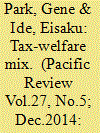| Srl | Item |
| 1 |
ID:
133279


|
|
|
|
|
| Publication |
2014.
|
| Summary/Abstract |
We undertake an individual-level analysis of mass political behavior toward sovereign debt resettlement by leveraging the unique circumstances of a 2011 referendum on debt repayment in Iceland. This allows us to engage broader questions about mass international political economy. Against the recent thrust of a growing literature, we find evidence of material economic "pocketbook" effects-self-interest-on voting behavior, operating alongside symbolic/sociotropic and partisan/political logics. Contrary to expectations, these self-interest effects are not conditional on voter sophistication. We conclude that conventional sampling frames may be inappropriate for understanding contemporary democratic contestation over international economic policy.
|
|
|
|
|
|
|
|
|
|
|
|
|
|
|
|
| 2 |
ID:
097821


|
|
|
| 3 |
ID:
153331


|
|
|
| 4 |
ID:
087230


|
|
|
|
|
| Publication |
Cambridge, Harvard University Press, 1970.
|
| Description |
277p.hbk
|
| Standard Number |
674868404
|
|
|
|
|
|
|
|
|
|
|
|
Copies: C:1/I:0,R:0,Q:0
Circulation
| Accession# | Call# | Current Location | Status | Policy | Location |
| 009542 | 336.2009861/BIR 009542 | Main | On Shelf | General | |
|
|
|
|
| 5 |
ID:
135073


|
|
|
|
|
| Summary/Abstract |
Despite having the highest level of public debt in the Organisation for Economic Co-operation and Development (OECD), higher than Greece or Italy, Japan has one of the lowest aggregate tax burdens of the advanced industrial democracies. This paper asks why Japan, once described as a strong developmental state, has had such a weak extractive capacity, an inability to raise revenues to confront deficits and public debt? In contrast to the existing explanations that focus on political institutions, partisan preferences, or economic globalization, this article argues that Japan's ‘tax–welfare mix’ – the combination of taxes and redistributive welfare polices – undermined the state's long-term capacity to secure adequate tax revenue. More than just a source of revenue, taxes can be used directly to achieve redistributive goals, such as targeting low taxes and exemptions to specific groups. This study shows how Japan's tax–welfare mix diminished its extractive capacity through three mechanisms: the political lock-in of a redistributive social bargain struck around low taxes, the timing and sequencing of its tax policy and welfare development, and the erosion of public trust, which undermined tax consent. Beyond offering a new theory of extractive capacity, the tax–welfare mix explains aspects of Japan's tax structure that defy existing explanations and contributes to our understanding of the capitalist development state by highlighting the redistributive political function of tax policy and its long-term impact on state capacity.
|
|
|
|
|
|
|
|
|
|
|
|
|
|
|
|